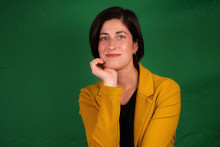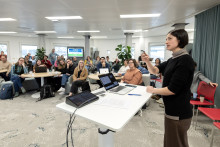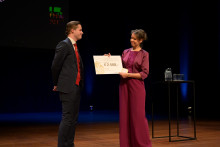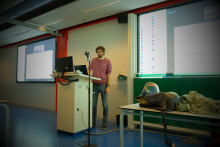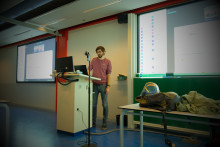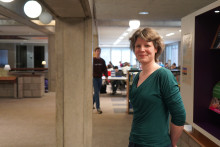What is it you do exactly as an educational consultant?
‘I work at the Centre of Expertise in Learning and Teaching (CELT). For four days a week, I am seconded to the BMS faculty. During these days, I’m supporting teachers and programmes with the quality and innovation of their education – while for instance also helping them acquire educational innovation grants. The other day in the week I work for CELT on central projects. During this day, I’m a trainer in the Senior University Teaching Qualification programme, giving workshops on methodology for evidence-informed educational innovation. I’m also part of the expertise team on artificial intelligence – specifically when it comes to AI literacy and the use of AI in assessments.’
How do you see this university dealing with AI?
‘I currently see programmes wanting to update their curricula and that teachers are also looking at ways to help their students use AI responsibly, ensuring that it doesn’t intervene with their learning processes. I think we’re past the stage that people are pretending AI isn’t there, which seems like a good thing in my book.’
What do you like about your work?
‘The variety, for sure. But more importantly, I like the aspect that I’m working with people who are very passionate and driven. There’s a kind of motivation that’s very contagious. That’s maybe also why I’ve always gravitated towards working in education. Nowadays, there’s so much that is expected of an individual teacher; they need to design, teach, give feedback, innovate, keep their knowledge up-to-date… That’s just too much to handle for one person, so I hope to support them as an educational consultant.’
How did you end up at the University of Twente?
‘I was doing a PhD in the United Kingdom, where I was using a framework called ‘educational design research’ – which originates from Susan McKenney’s group at the UT. I wanted to first-hand learn from the experts on the topic, by coming here for an exchange. I thought I would be in Enschede for six months, but I’ve been here now for over three years – working here as an educational consultant, while I was still finishing my PhD at the University of Surrey. I really like it here. It’s also the place where I met my boyfriend – an Enschede local – three years ago.’
What did you do prior to your PhD?
‘If we’re talking about major milestones: I’ve been an interpreter since my early twenties – I also did my bachelor's and master’s in that field. So I’ve been interpreting at conferences and business negotiations, but also for art projects and theatre – in Italy, Germany and China. I’ve also started teaching interpreting – especially now that AI is challenging the craft. I’m still a bit sad about that; even though there are tools to make it easier to communicate across languages, there’s way more to communication than just that. The human factor.’
Did you always have a knack for languages?
‘I’ve always loved to travel and indulge myself in other cultures. I’m originally from an southern Italian village called Termoli – which is in a region that most Italians joke about that it doesn’t exist. Growing up, I was known as ‘the girl who speaks English’ in my school. I wouldn’t necessarily say I have a talent for languages, it’s also a lot of hard work. And finding the time. While I can speak five languages fluently, I’m currently having more trouble learning Dutch than I had learning Chinese.’
What do you like to do in your spare time?
‘I really like to be in nature. Whether it’s hiking, rock climbing or scuba diving, I just love to be outdoors. Visiting New Zealand again is definitely on my bucket list! Besides reading and playing the ukelele, I’m also passionate about aerial silks (doing aerial acrobatics while hanging from a specialist fabric, ed.). I’m also a teacher at my association, which I love doing. It gives me a lot of motivation to be the best in whatever I do.’
An ‘On the Spot’ classic: what did you eat yesterday?
‘A vegetable soup with ciabatta bread. Nothing special, really.’
And here I was, hoping for an Italian cuisine masterclass…
‘I do like to cook a lot of Italian food, which is usually a more vegan representation of traditional Italian dishes. We eat plant-based. At first it seemed a bit hard to find alternatives for meat, but you get used to finding tasty alternatives very quickly. If it were up to me, I’d say it’s about time we only serve vegan food on campus.’
How do you like the Dutch cuisine?
‘What cuisine? I’m joking, I do like a stamppot every once in a while.’
Let me rephrase it: what can we in the Netherlands learn from the way Italians approach food?
‘I’d say: take the time to cook, especially for other people. When you have a birthday party in Italy, there’s probably home-cooked food being served, that’s been prepared for hours. In the Netherlands, it’s approached as something quite hasty and efficient. There’s something beautiful in taking the time to cook for others. It’s good to try every once in a while.’


